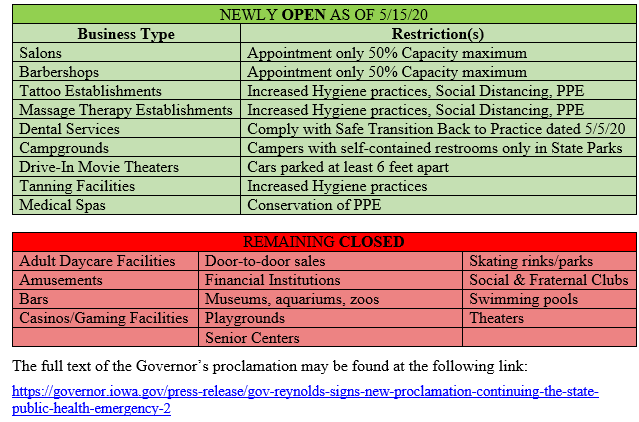Atlantic, IA – COVID-19 is a new virus and many Cass County residents aren’t sure how to know if they have been infected, and if they have, what they should do about it. With so much information available on the internet, and not all of it accurate, Cass County Public Health reminds residents the statewide COVID-19 information line is available at 2-1-1 to answer these kinds of questions.
“We are learning more about COVID-19 each day,” said Cass County Public Health Director Beth Olsen. “We want to provide the most accurate information we have to help slow the spread of the virus in our county and protect our most vulnerable residents.” Here are some of the most frequent questions public health has received:
What are the symptoms of COVID-19?
The most common symptoms of COVID-19 are fever, cough, and shortness of breath. These symptoms may appear 2 to 14 days after exposure to another infected individual. Other symptoms include chills, muscle pain, sore throat, or new loss of taste or smell.
What should I do if I have these symptoms?
It’s important to know that 80% of people who get COVID-19 will have mild to moderate illness – similar to a bad cold, and some people may not have any symptoms. If you feel mildly ill, take these steps:
• Stay home. People who are mildly ill are able to recover at home.
• Treat your symptoms as you would any respiratory virus. Drink fluids, rest and treat your cough with over-the counter medication.
• Call your health care provider before you go into the office. Your provider will determine if you should be
tested.
• Separate yourself from others in your home. You can spread the illness, even when you’re mildly ill, so to
protect others in your household, try to stay away from others as much as possible. The majority of cases in
Iowa were due to household contact spread.
Who should be tested?
To learn if you have a current infection, viral tests are used. But not everyone needs this test. If you have symptoms of COVID-19 and want to get tested, call your healthcare provider first. You can also take an online assessment at testiowa.com to see if you qualify for testing at a Test Iowa site.
If you test positive for COVID-19 by a viral test, follow the instructions given to you by your healthcare provider. Cass County Public Health will also call you for the purposes of contact tracing, to investigate who you were in close contact with recently so that those individuals can be notified and self-isolate to help prevent further spread of COVID-19.
If you test negative, you probably were not infected at the time your sample was collected. However, that does not mean you will not get sick. The test result only means that you did not have COVID-19 at the time of testing.
Are people in Cass County being tested for COVID-19?
Yes. As of May 14, there have been 236 people tested at Cass County Health System. People may also be tested at other medical facilities, at a Test Iowa site, or at long-term care facilities and nursing homes.
Are other counties testing more than Cass County?
By looking at the available data from coronavirus.iowa.gov, as well as what is being reported at the county level, Cass County’s testing rates are comparable or slightly higher than other counties that have low levels of positive cases. Some counties have much higher testing numbers because of surveillance testing being done due to an outbreak at a meat packing plant or long-term care facility, or because they have a Test Iowa site.
Now that things are reopening, do I still need to wear a mask? I’m not sick.
Yes. We encourage you to wear a mask, practice good hand hygiene, and practice social distancing— keeping at least 6 feet of distance between people—whenever possible. Wearing a mask helps keep your germs away from others, which is really key to preventing spread because some people who get COVID-19 never develop symptoms but can still spread it to others. By wearing a mask, you’re demonstrating concern for those around you. The other advantage to wearing a mask is that it keeps you from touching your face. By keeping your hands away from your eyes, nose, and mouth, you are decreasing your risk of infection. Remember to wash or sanitize your hands before wearing and after removing your mask, too.
Where can I get a mask?
Cass County Public Health has some cloth masks that we are a happy to give to those who need one. Our office is located at 1408 East 10th Street, which is just across the street from the employee parking lot at CCHS. There are also sewing and no-sew instructions on cdc.gov if you want to make your own.
What are N95 masks? Should I get one and wear it?
An N95 respirator is a respiratory protective device designed to achieve a very close facial fit. The N95 designation means that when subjected to careful testing, the respirator blocks at least 95% of very small particles. If properly fitted, the filtration capabilities of N95 respirators exceed those of face masks. For the general public, an N95 isn’t necessary because without proper fit testing, the respirator may not be as effective as intended. Even health care workers generally only use an N95 respirator during certain procedures; the rest of the time they would wear a standard surgical mask. And remember, wearing a mask is about keeping your germs away from others, so wearing any mask and practicing social distancing is the best way to protect those around you.
Who is at most risk for serious complications of COVID-19?
Based on currently available information and clinical expertise, older adults and people of any age who have serious underlying medical conditions might be at higher risk for severe illness from COVID-19. Based on what we know now, those at high-risk for severe illness from COVID-19 are:
• People 65 years and older
• People who live in a nursing home or long-term care facility
• People of all ages with underlying medical conditions, particularly if not well controlled, including:
o People with chronic lung disease or moderate to severe asthma
o People who have serious heart conditions
o People who are immunocompromised
o People with severe obesity (body mass index [BMI] of 40 or higher)
o People with diabetes
o People with chronic kidney disease undergoing dialysis
o People with liver disease
If you have additional questions, call the 2-1-1 COVID-19 information line. For up-to-date information on COVID-19, visit the IDPH webpage at https://idph.iowa.gov/Emerging-Health-Issues/Novel-Coronavirus and follow the department on Facebook at @IowaDepartmentOfPublicHealth and on Twitter at @IAPublicHealth.







